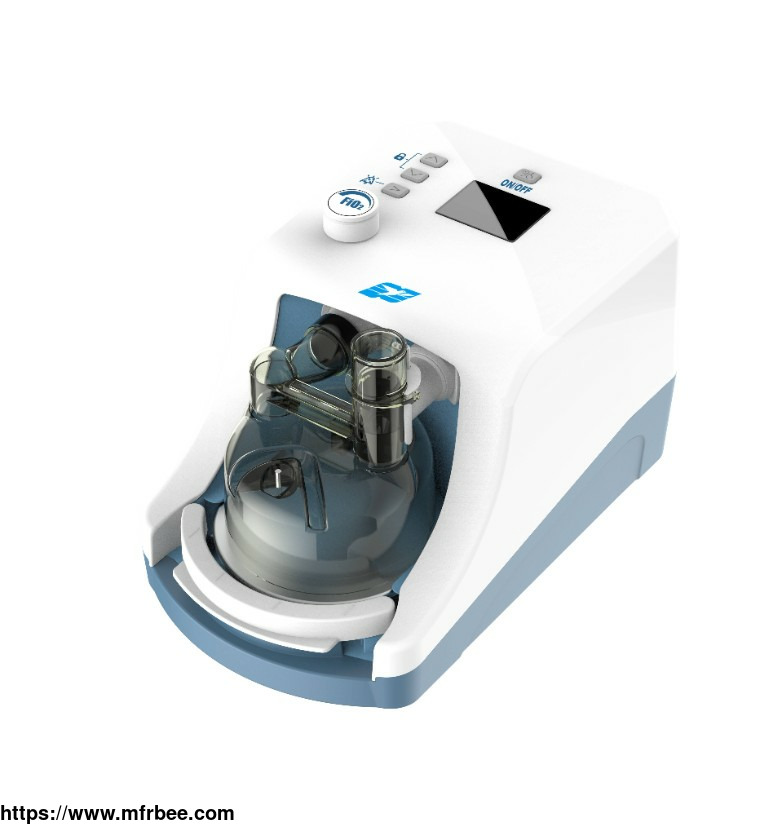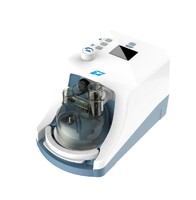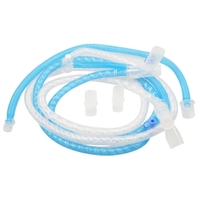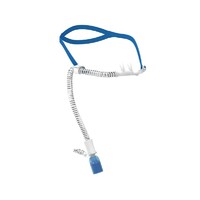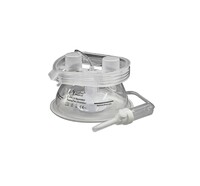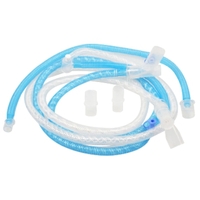High Flow Nasal Cannula (HFNC) Manufacturer
Specifications
High Flow Nasal Cannula machine (HFNC machine), also known as medical high flow oxygen machine, is a high flow oxygen delivery device. High Flow Nasal Cannula is full form of HFNC in medical. As we
can know from the name, the high flow nasal cannula machine provides oxygen flow for the nasal cannula, and the china hfnc oxygen flow rate would be high. It can be used for neonates or adults when
using different types of high flow nasal cannulas.
During the treatment of serious pneumonia cases, in addition to medicine treatment, respiratory support treatments such as oxygen therapy, invasive mechanical ventilation, non-invasive ventilation,
extracorporeal membrane oxygenation (ECMO), and circulatory support are chosen and used. HFNC machine also plays an important role in the treatment of critically ill patients. As there is shortage
of medical air compressor ventilator in many hospitals, sometime Cannula HFNC machine is another option for doctors to treat patients in some cases. High flow nasal cannula devices are considered
by doctors for the early infection cases and the recovery stage of patients from critical stages.
As a professional high flow nasal cannula manufacturer, Pigeon Medical has more than 30 years of experience in producing high-quality high flow nasal cannula equipments and has already becoming one
of the famous high flow nasal cannula brands . You can believe that Pigeon Medical is your best high flow nasal cannula companies, We aim to offer you the best and reliable high flow nasal cannula
china prices. If you need more information, please contact us, we are ready to support you.
How Does HFNC Work?
The high flow nasal cannula (HFNC machine) is a heating and humidification system that allows the delivery of a specified percentage of inhaled oxygen (FIO2) levels at very high flow rates. It
delivers adequately heated and humidified medical gas up to 60L/min speed, and is considered to have a number of physiological effects: reduction of anatomical dead space, PEEP effect, constant
fraction of inspired oxygen and good humidification. High flow nasal cannula equipment is widely used in RICU and ICU. High flow nasal cannula works as following steps:
1. Precise Oxygen Supply
The traditional nasal cannula provides a flow rate of 2–6 L/min. However, the peak inspiratory flow rate may be much higher in patients with respiratory distress. If the patient's inspiratory flow
rate is greater than the flow rate provided by the cannula, the patient will draw room air into the lungs. This will result in oxygen dilution, and the patient will not be able to get the precise
amount of oxygen required. When high-flow nasal cannula (HFNC) is used for oxygen supply, its flow rate is much higher than that of traditional nasal cannula. This results in more prescribed oxygen
delivery to the lungs and reduces entrainment of indoor air. The oxygen you want to deliver to the patient is not easy to produce the same dilution effect!
2. Increased Functional Remaining Capacity
HFNC machine also works by providing some variable positive pressure. In the case of closed mouth breathing, when the pressure is measured with a pressure gauge in the posterior oropharynx, the
pressure is moderate, but when the patient opens the mouth, this effect almost disappears. Despite this difference, research shows that when HFNC is applied, the functional remaining capacity (FRC)
increases by approximately 25%.
3. Dead Space Flushing
Finally, when HFNC is applied, continuous high-flow oxygen flushes the anatomical dead space of the oropharynx and proximal tracheobronchial tree to improve breathing efficiency.
HFNC Machine Uses And Features
Much More Stable and Higher Inhaled Oxygen Concentration
High flow oxygen therapy uses a special high-flow nasal cannula (HFNC machine) and heated breathing circuit. Used for heating and humidifying mixed air and oxygen at high flow rates, usually set
between 30 l/min and 50 l/min. This high flow can provide a more stable inhaled oxygen concentration than traditional oxygen therapy, and can also generate a certain positive end-expiratory
pressure.
Precaution For Respiratory Failure
The HFNC system is also used to remove CO2 exhaled from oxygen-rich gas from the airway inhalation dead space. High flow oxygen therapy can be effectively used to treat patients with mild to
moderate hypoxic respiratory failure. As a preventive measure for respiratory failure after extubation, high-flow intubation has proven to be effective and is consistently better tolerated than NIV
therapy.
Better User Experiences
High-flow oxygen therapy adopts nasal cannula, which is more comfortable for patients and can be used continuously for a long time. The air flow is humidified and heated in a controlled manner.
This prevents drying of the mucous membranes and related disadvantages. It only requires a source of oxygen and compressed air and a heating/humidification system.
Contact Pigeon Medical for more info of HFNC machine cost.
High Flow Nasal Cannula VS Ventilator
The high flow nasal cannula (HFNC machine) heats and humidifies the oxygen through a special device, so the patient will feel very comfortable when using it. Humidification can increase the
humidity of the respiratory mucosa, which is conducive to the discharge of secretions and avoids dryness. The role of non-invasive positive pressure ventilation (NPPV, NIPPV) is to assist patient
ventilation. For example, the patient has difficulty breathing or has hypercapnia. The use of a ventilator ventilator can increase the patient's ventilation and improve the patient's gas exchange
capacity.
Want to know what is a high flow oxygen machine and types of high flow oxygen delivery systems, please contact us.
- Country: China (Mainland)
- Business Type: Manufacturer
- Founded Year: 2001
- Address: No.118,Block 6,ZhuYuan,ChiWei Township,PuNing City, GuangDong,China.
- Contact: pigeon medical
